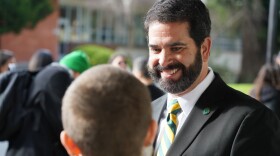
Talk Humboldt
Thursday during All Things Considered, and Friday during Morning Edition
What exactly do people in Humboldt do for a living, and why? Keith Flamer of College of the Redwoods and Richard Carvajal of Cal Poly Humboldt talk to the people that make Humboldt work. Hear it Thursdays during All Things Considered and an encore broadcast Fridays on Morning Edition.
-
Three college presidents talk about the big themes that inform their work.
-
The debut of new co-host Richard Carvajal explores his Humboldt roots, his own homelessness, and the role of mentorship.
-
-
Homesharing helps Humboldters save money by linking empty rooms with folks who need them.
-
Swarmed by dragonflies. All-nighters. "Big weather." Harrison Ibach loves being a fisherman.
-
Part 1 of a series about commercial fishing from Humboldt Bay.
-
Part II of a conversation about the worklife of a pastor.
-
Pastor Bethany Cseh wants more inclusivity and less dogma in religious conversations.
-
For Humboldt radio listeners, the voice of JB Mathers has been ubiquitous since the late 1990s.
-











